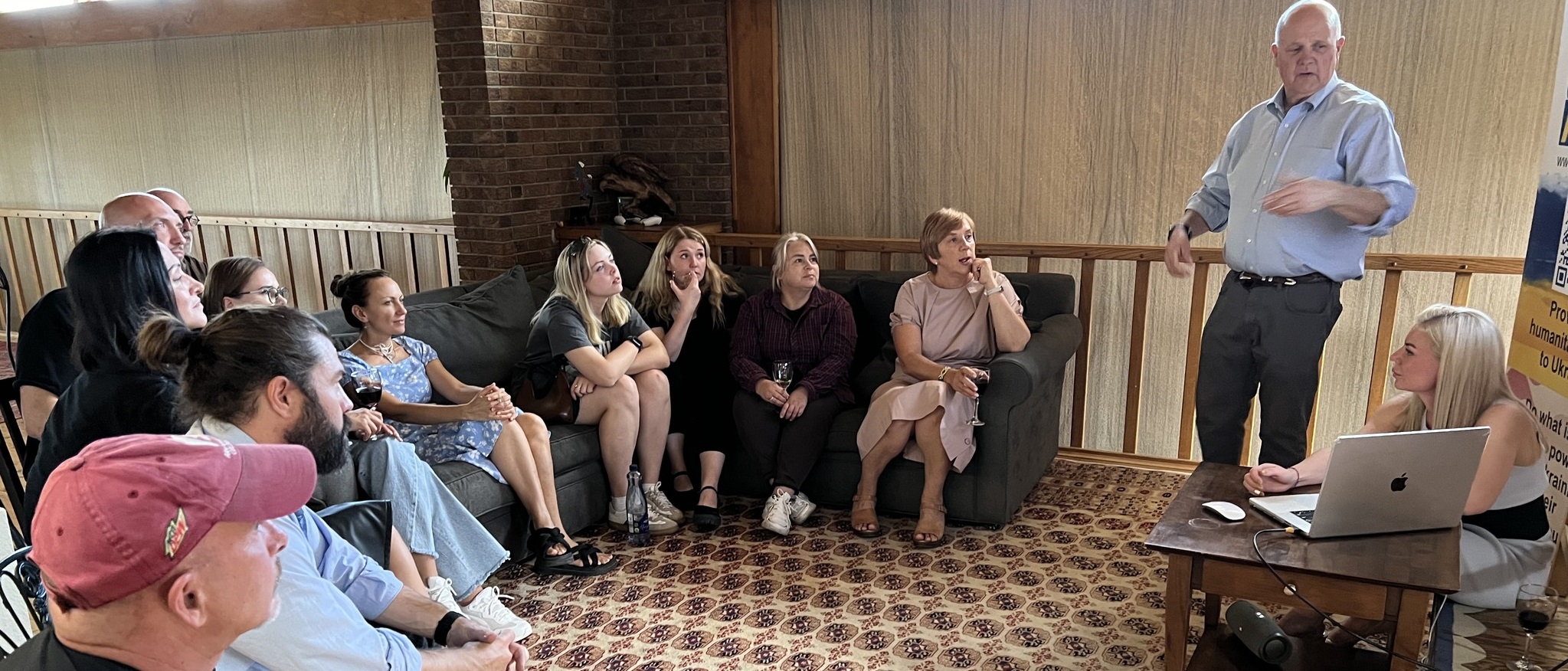Originally posted on Gazette.com
By: Vince Bzdek
Ostensibly, three Ukrainian journalists visited Gazette newsrooms last week to learn techniques from us that will help them report the war more powerfully.
Our investigative team showed them how to navigate public records systems to help them do journalism that can affect policy change. Our digital team taught them the latest multimedia strategies, and our military reporter Mary Shinn walked them through approaches for covering strategy and tactics. We also showed them how platforms like TikTok and Instagram are reshaping journalism, and how to harness those tools to expand their reach to a broader audience.
But I’m not sure we didn’t learn more from them than they did from us — about practicing journalism in a war zone, about battling down disinformation through courageous fact-checking, about staying alive when your schools and homes and hospitals are getting shelled.
And about the very real, very essential value of journalism in keeping a battered democracy alive.
“Instead of self development and leading our lives, we became reporters to document war crimes,” said Oksana Kryvitska, one of the visiting journalists, who writes fact-check and analytical pieces for Vgoru to debunk Russian misinformation and propaganda.
Hanna Shchydlovska transitioned from a copywriting career into journalism at the beginning of Russia’s full-scale war in 2022. She started as a web site moderator at Vgoru and now writes about people who have suffered as a result of the invasion.
Yelyzaveta (Liza) Zharkykh, deputy editor in chief of Vgoru, records interviews and produces video reports on the consequences of Russia’s war in the Kherson region.
Like the soldiers in their country, they have all put their lives on hold to join in the fight.
“The bloom of our nation, the best minds of our nation, they have to go fight,” said Kryvitska. “There is no choice because if they don’t, the territory will be completely captured. So Russia continues this manipulation and this politics of basically erasing all the best representatives, all the activists, all the young men and women.”
We also learned about resourcefulness from our Ukrainian friends. Hanna’s mother is trapped in occupied territory while Hanna reports from the liberated city of Kherson. Unfortunately, Russians block Ukrainian media in the occupied territories. So Hanna has taught her mom how to see her reports on Telegram now that the Vgoru site has been blocked.
And we learned about resilience.
The journalists recently produced a documentary telling how Ukraine has united and how volunteers have come out of the woodwork to help save people and save animals while the city of Kherson was under occupation.
Vgoru tries to assemble documentary records of all these people’s lives and their efforts to maintain normalcy. “It’s not that they just put their head down and say everything is destroyed, Russia is attacking. You continue doing what you have to do, regardless of the situation,” Kryvitska said.
We learned that even while an enemy state is trying to destroy you, you can start to rebuild.
“The reconstruction has started, and there are a lot of donors, but the point is it’s not going fast because the destruction is going way faster,” said Zharkykh. “The speed of the reconstruction doesn’t equal the speed of the destruction. It is very important still to help with reconstruction and invest in it.”
We learned that a piece of land is not just a piece of land to Urkainians, it is their grounding and their soul, it is the motherland, it is home.
“We need you to understand that people may think we’re far away from the rest of the world, and that’s why a lot of politicians say, ‘Oh, we should start the agreements, the deals, maybe you should give up some territory,’” Liza told us. “But for these people it’s very hard to hear about accommodations because it is their home. It’s easy to say when you’re not connected to this land. But it makes it hard when someone tells you to forget your land and your home.”
What we leaned, more than anything, is not to take freedom for granted. Ever.
“One of the things we would most like the American people to know is that we have a lot in common,” said Kryvitska. “Not only are we hard-working but we value freedom the most.”
Hanna felt it the first day she was in America, she said. She was free again, like she hadn’t been free for years. Their week here was a whirlwind of freedom orchestrated by our colleague Evan Wyloge, packed with everyday opportunities we all have, but which they took to with the relish of newly released prisoners.
And they wanted to do everything. They took a gondola to the top of a mountain, dined among the animal heads at Buckhorn Exchange, toured the Capitol and took a selfie with Gov. Jared Polis, freely mingled with fellow journalists at The Denver Press Club for a night, were feted as guests of honor at a catered reception hosted by Ukraine Power, and connected and commiserated with displaced Ukrainians living in Colorado Springs.
Watching them soak up their temporary week of freedom in our country, it’s impossible not to see our abundant blessings with fresh eyes. We get to grow old the way we want to grow old. Our schools don’t have torture chambers in the basement, like one of the schools in Kherson did. Our oncologists aren’t targeted by drones as they drive to the hospital. Our teachers teach the ABCs, not the difference between a bomb, a rocket and a drone.
“People, despite the war, despite the drone attempts, they are still harvesting, they are still in the fields, they do everything possible to continue to do their jobs,” Kryvitska said.
“People still live in the cities, they give birth, they try to keep up with this life and continue it,” she added.
“Being suppressed and manipulated for so long creates a great hunger for freedom.”
Vince Bzdek, executive editor of The Gazette, Denver Gazette and Colorado Politics, writes a weekly news column that appears on Sunday.

